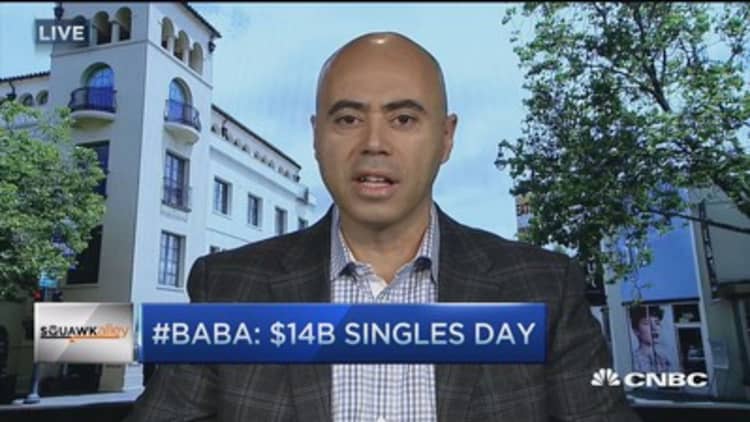


Alibaba's astronomical Singles' Day sales failed to boost its share price, with shares closing down 2 percent in New York on Wednesday and analysts flagging a cautious outlook.
The e-commerce behemoth handled $14.3 billion in sales over the 24-hour shopping period, a 60 percent increase compared to 2014. So, why weren't markets and commentators impressed?
"The stock was up initially until Jack Ma made some cautionary comments about growth expectations in China and the impact on Alibaba," explained Victor Anthony, managing director and senior internet media analyst at Axiom Capital Management.
Speaking exclusively to CNBC on Wednesday, Alibaba's 51-year old founder said the next five to 15 months would be a tough time for the mainland, citing the impact of President Xi Jinping's anti-corruption fight. But he said Beijing's 7 percent gross domestic product (GDP) target was still achievable during that time frame.
Alibaba shares are down more than 20 percent year-to-date as the world's second-largest economy grows at its slowest pace since 2009, with GDP sliding below 7 percent in the July-September quarter amid weakening investment, excess capacity in the industrial sector and a strong currency.
Because Alibaba's business model relies on consumption, a broad economic slowdown is worrisome in the longer term and offsets any short-term boost from record Singles' Day sales, some strategists said.
"The largest area of concern [for Alibaba] is the slowdown of [Chinese] growth and how that might trickle down to domestic consumption, that's the dark cloud over all the Chinese internet names today," noted Rob Sanderson, managing director at MKM Partners.
Read MoreSingles' Day's one big downside? It's too good
Others were more upbeat on Alibaba's outlook. ABR Investment Strategy chief executive Brad Gastwirth acknowledged that negative sentiment on the company's stock was directly tied to views on the broader economy, but he said it was misguided.
"We believe that this is a complete misread for China internet/e-commerce. Those companies are delivering solid fundamentals even during a time that the country is slowing," Gastwirth told CNBC in an email interview.
Wednesday's decline could also be explained in part by an old market adage.
It was a typical buy the rumor, sell the news situation, explained Hany Nada, GGV Capital co-founder and managing partner. "They had a good day Tuesday and I think many investors felt it was a good time to exit the stock."
Key things to watch
Experts agree that the catalyst for shares going forward will be mobile monetization rates.
The company has long struggled with a low rates on mobile compared with desktop, which has been widely blamed on the smaller screens of mobile phones failing to show the same number and size of ads as a PC. But the company's recent third-quarter earnings revealed significant improvement, with mobile monetization rising to 2.39 percent from 1.87 percent last year.
"A follow through on that metric will lift the stock because there's a lot of earnings leverage on that," said Sanderson.
Indeed, more progress on mobile monetization and financial payment mechanisms could potentially be a source of growth for net revenue, agreed Nada.
Standard and Poor's is optimistic, expecting Alibaba to continue growing mobile traffic as it transitions from a PC-based platform.
"We believe the growing mobile penetration rates will further attract traffic to Alibaba's online marketplace platform, and enhance user experience and stickiness when making purchases," the ratings agency said in a note.
In the short-term however, the company's share price could trade in a narrow range.
"There's no clear catalyst for the stock from now until they report results early next year, because Chinese don't participate in the holiday shopping season in the same way as the U.S. or Europe," noted Anthony.

